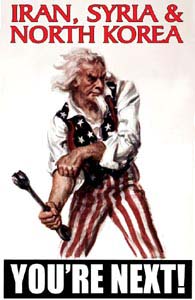Pam H just emailed me Ben Stein’s
last column, which he wrote in December of 2003. His column is so moving I will post it in this space:
How Can Someone Who Lives in Insane Luxury Be a Star in Today's World?
As I begin to write this, I "slug" it, as we writers say, which means I put a heading on top of the document to identify it. This heading is "eonlineFINAL," and it gives me a shiver to write it. I have been doing this column for so long that I cannot even recall when I started.
Lew Harris, who founded this great site, asked me to do it maybe seven or eight years ago, and I loved writing this column so much for so long I came to believe it would never end.
But again, all things must pass, and my column for E! Online must pass. In a way, it is actually the perfect time for it to pass. Lew, whom I have known forever, was impressed that I knew so many stars at Morton's on Monday nights.
He could not get over it, in fact. So, he said I should write a column about the stars I saw at Morton's and what they had to say.
It worked well for a long time, but gradually, my changing as a person and the world's change have overtaken it. On a small scale, Morton's, while better than ever, no longer attracts as many stars as it used to. It still brings in the rich people in droves and definitely some stars.
I saw Samuel L. Jackson there a few days ago, and we had a nice visit, and right before that, I saw and had a splendid talk with Warren Beatty in an elevator, in which we agreed that Splendor in the Grass was a super movie.
But Morton's is not the star galaxy it once was, though it probably will be again.
Beyond that, a bigger change has happened. I no longer think Hollywood stars are terribly important. They are uniformly pleasant, friendly people, and they treat me better than I deserve to be treated. But a man or woman who makes a huge wage for memorizing lines and reciting them in front of a camera is no longer my idea of a shining star we should all look up to.
How can a man or woman who makes an eight-figure wage and lives in insane luxury really be a star in today's world, if by a "star" we mean someone bright and powerful and attractive as a role model?
Real stars are not riding around in the backs of limousines or in Porsches or getting trained in yoga or Pilates and eating only raw fruit while they have Vietnamese girls do their nails. They can be interesting, nice people, but they are not heroes to me any longer.
A real star is the soldier of the 4th Infantry Division who poked his head into a hole on a farm near Tikrit, Iraq. He could have been met by a bomb or a hail of AK-47 bullets. Instead, he faced an abject Saddam Hussein and the gratitude of all of the decent people of the world.
A real star is the U.S. soldier who was sent to disarm a bomb next to a road north of Baghdad. He approached it, and the bomb went off and killed him.
A real star, the kind who haunts my memory night and day, is the U.S. soldier in Baghdad who saw a little girl playing with a piece of unexploded ordnance on a street near where he was guarding a station. He pushed her aside and threw himself on it just as it exploded. He left a family desolate in California and a little girl alive in Baghdad.
The stars who deserve media attention are not the ones who have lavish weddings on TV but the ones who patrol the streets of Mosul even after two of their buddies were murdered and their bodies battered and stripped for the sin of trying to protect Iraqis from terrorists.
We put couples with incomes of $100 million a year on the covers of our magazines. The noncoms and officers who barely scrape by on military pay but stand on guard in Afghanistan and Iraq and on ships and in submarines and near the Arctic Circle are anonymous as they live and die.
I am no longer comfortable being a part of the system that has such poor values, and I do not want to perpetuate those values by pretending that who is eating at Morton's is a big subject.
There are plenty of other stars in the American firmament. The policemen and women who go off on patrol in South Central and have no idea if they will return alive. The orderlies and paramedics who bring in people who have been in terrible accidents and prepare them for surgery. The teachers and nurses who throw their whole spirits into caring for autistic children. The kind men and women who work in hospices and in cancer wards.
Think of each and every fireman who was running up the stairs at the World Trade Center as the towers began to collapse.
Now you have my idea of a real hero.
Last column, I told you a few of the rules I had learned to keep my sanity. Well, here is a final one to help you keep your sanity and keep you in the running for stardom: We are puny, insignificant creatures.
We are not responsible for the operation of the universe, and what happens to us is not terribly important. God is real, not a fiction, and when we turn over our lives to Him, he takes far better care of us than we could ever do for ourselves.
In a word, we make ourselves sane when we fire ourselves as the directors of the movie of our lives and turn the power over to Him.
I can put it another way. Years ago, I realized I could never be as great an actor as Olivier or as good a comic as Steve Martin--or Martin Mull or Fred Willard--or as good an economist as Samuelson or Friedman or as good a writer as Fitzgerald. Or even remotely close to any of them.
But I could be a devoted father to my son, husband to my wife and, above all, a good son to the parents who had done so much for me. This came to be my main task in life.
I did it moderately well with my son, pretty well with my wife and well indeed with my parents (with my sister's help). I cared for and paid attention to them in their declining years. I stayed with my father as he got sick, went into extremis and then into a coma and then entered immortality with my sister and me reading him the Psalms.
This was the only point at which my life touched the lives of the soldiers in Iraq or the firefighters in New York. I came to realize that life lived to help others is the only one that matters and that it is my duty, in return for the lavish life God has devolved upon me, to help others He has placed in my path. This is my highest and best use as a human.
As so many of you know, I am an avid Bush fan and a Republican. But I think the best guidance I ever got was from the inauguration speech of Democrat John F. Kennedy in January of 1961.
On a very cold and bright day in D.C., he said, "With a good conscience our only sure reward, with history the final judge of our deeds, let us go forth...asking His blessing and His help but knowing that here on Earth, God's work must surely be our own."
And then to paraphrase my favorite president, my boss and friend Richard Nixon, when he left the White House in August 1974, with me standing a few feet away, "This is not goodbye. The French have a word for it--au revoir. We'll see you again."
Au revoir, and thank you for reading me for so long. God bless every one of you. We'll see you again.
I completely agree with Ben Stein, movie “stars” are the most successful (and, consequently, the best paid) of our entertainers. Movie stars are entitled to due respect for their talents as entertainers but no more respect than that.
I also have no quarrel with whatever salary they can command; they produce huge profits for their employers. I also have no problem with certain actresses being manicured while being limo’ed somewhere. They’ve earned their money and they can spend it as they please.
That being said, earning huge bucks and using it for the purposes of living as high as possible, supporting huge consumption and being serviced by the hired help reveals self-indulgence, not virtue.
Virtue is a “values” word. You cannot discriminate between virtuous behavior and typical movie stars’ behavior unless you have the values necessary to recognize virtue—or the lack of it.
Today the word “virtue” has connotations of quaintness. This is largely the fault of our entertainment industry. Ironically, it is an industry that wouldn’t exist without virtuous Americans because America herself wouldn’t exist without virtuous Americans; virtuous America makes self-indulgent America possible.
Being a warrior is one of the least self-indulgent things a man can do. A military—ideally—is a socialist meritocracy. It is socialist because, in the military, ideally, the group is more important than the individual. It is a meritocracy because, ideally, a soldier’s standing is determined by his competence.
The military’s uncompromising devotion to competence and high performance is rooted in the harsh consequences of incompetence and inadequate performance: death and mutilation on the battlefield. Consequently military training is rigorous and sometimes harsh.
Combat is often conducted in harsh conditions. The summertime temperatures in Iraq exceed 120° F, Tora Bora (al Qaeda’s Afghan mountain sanctuaries) are some of the world’s most forbidding mountains with elevations to 10,000 feet and are snow-capped year-round.
The contrast cannot be made more stark. A man enlisting for military duty is voluntarily surrendering some of his civil rights so that he may endure the regimentation of the military's socialist culture, hardship, harsh conditions, hard training, the risk of death and mutilation and low pay all for the purpose of preserving a society of individuals, some of which are as undeserving of their blood as the entertainers Ben Stein wrote about.
Ben Stein’s essay celebrates the virtue of our most virtuous—our warriors—while being troubled that our culture assigns outlandishly high prestige to the most self-indulgent and unworthy among us: our entertainers. He is also sufficiently self-aware to realize that his writings about which stars he saw eating at Morton’s sent messages that contributed to the inflated prestige our culture assigns to our entertainers. Ben Stein discontinued writing his column when he realized that this misplaced prestige also contributes to our culture’s disdain for our virtuous defenders.
Put another way, he saw his writing was contributing its small part to corroding the values that our virtue depends on and he knew he had to stop writing it. I suppose that he would demure and characterize quitting writing his column about movie stars he saw dining at Morton’s was a small thing but I know that his self-respect demanded it. After all, the advantage of virtue is self-respect.







